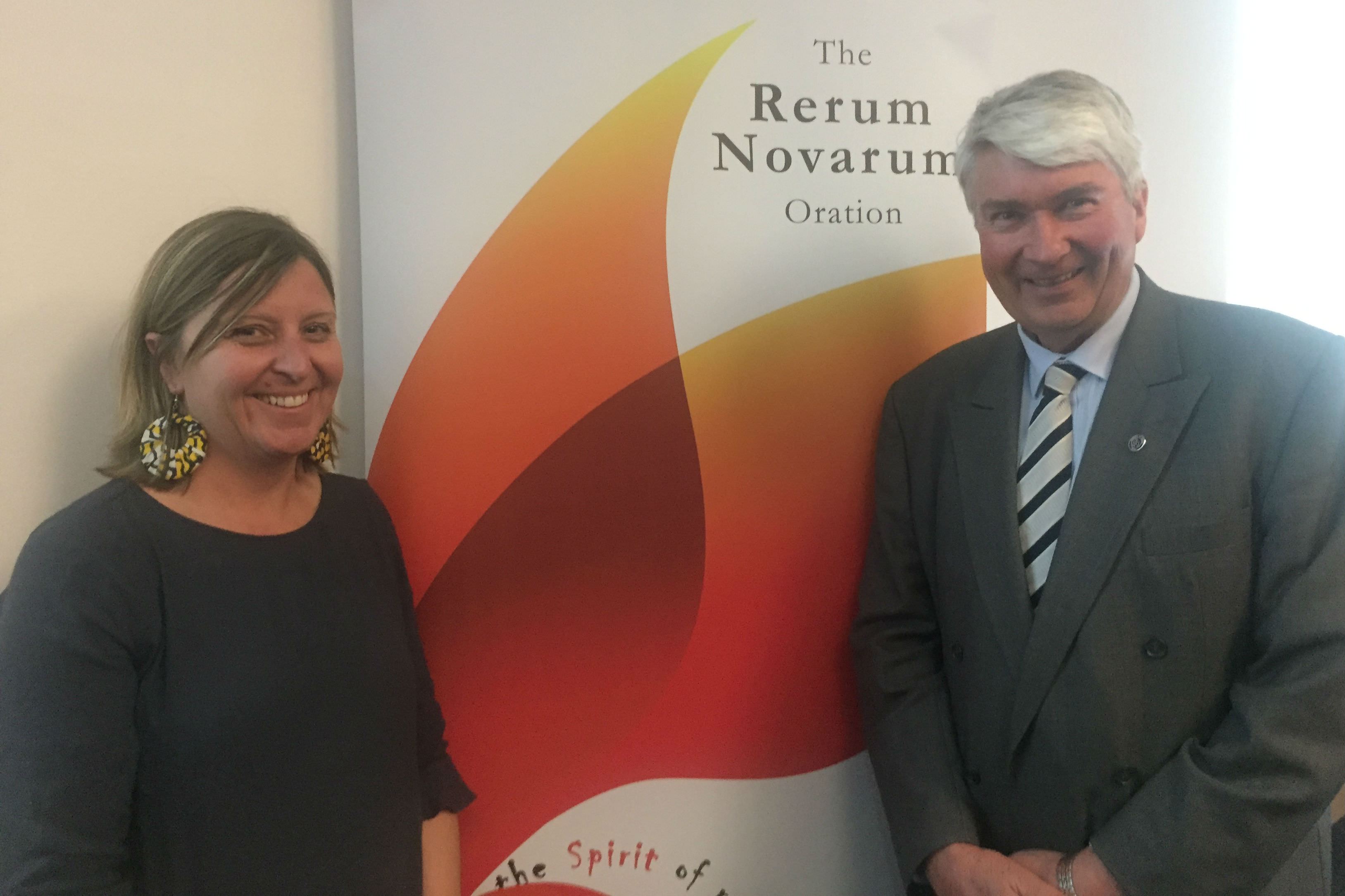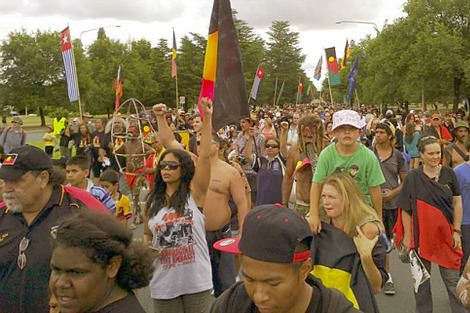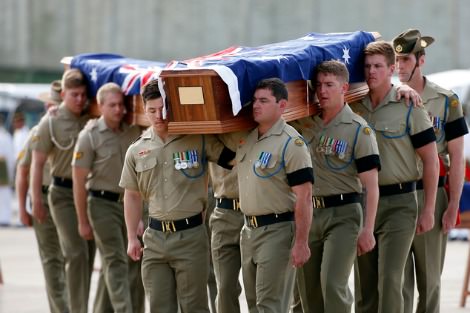Keywords: Forgotten Australians
-

RELIGION
- Frank Brennan
- 08 November 2017
'We need to recommit to work for all those who are able and willing. We need to recommit to social assistance for all those who are not able. We need to ensure that a life of frugal dignity is within the grasp of all citizens.' 2017 Rerum Novarum Oration by Fr Frank Brennan SJ
READ MORE
-

AUSTRALIA
- Frank Brennan
- 30 October 2017
9 Comments
The ogre in the book is John Howard, whom Rudd holds personally responsible for the attacks on Therese's decency and integrity in the lead up to the 2007 election. Rudd contends this 'cowardly behaviour' should not be forgotten, 'If only because this same ruthlessness remains a core part of the conservative DNA to this day'.
READ MORE 
-

RELIGION
- Frank Brennan
- 15 May 2017
The reconciliation of this vertical relationship is possible only through the mediation of Jesus who embodies, lives and dies the reality of this reconciliation. He puts us right with our God and thereby establishes the basis for right relationship with each other. In many countries such as Australia, Timor Leste and South Africa, the public rhetoric and programs for reconciliation have, at least in part, been informed and underpinned by this theological perspective.
READ MORE
-

INTERNATIONAL
- Susan Connelly
- 24 April 2017
20 Comments
Fearful of the southward thrust of the Japanese, the Australian government entered East Timor against the wishes of its Portuguese colonisers. The move was not to protect the Timorese, but to thwart possible attacks on Australia. A band of intrepid Australian soldiers, never numbering more than 700, successfully held off thousands of Japanese in Timor, but only because they had the support of the local people. Between 40,000 and 60,000 Timorese died as a result of Japanese reprisals.
READ MORE 
-

RELIGION
- Francine Crimmins
- 16 March 2017
8 Comments
My grandfather told me Patrick was a saint because he drove the frogs and snakes out of Ireland. He also told me if I stepped in a fairy ring while we were on our walks I'd disappear forever. So naturally as I grew older, I became skeptical. Each year in my family St Patrick's Day has marked a survival of Irish culture in Australia. Sometimes this can be in subtle ways and sometimes it means singing at the top of our lungs, enjoying a drink and having a dance.
READ MORE 
-

AUSTRALIA
- Celeste Liddle
- 23 January 2017
27 Comments
For many years I felt that by changing the date we might come to a more inclusive national celebration. However the past few years of Indigenous activism have left me cynical. The things we were fighting for decades ago are very similar to the things we're still fighting for. Australia has not acknowledged and rectified its history; rather it seems content to reinforce its amnesia. It's therefore unlikely I will be able to stop protesting this celebration, regardless of the day it's held upon.
READ MORE 
-

AUSTRALIA
- Jeremy Clarke
- 27 September 2016
1 Comment
Wiradjuri/Kamilaroi artist Jonathan Jones' piece is profoundly moving. At first glance it is little more than a quirky reconfiguring of the architectural footprint of the Garden Palace that burned to the ground on 22 September 1882, taking with it a collection of precious Indigenous relics. A more informed engagement however reveals that Jones has created a provocative re-imagining and, through this, a re-membering of Australian colonial contact history which has deep resonances for today.
READ MORE 
-

AUSTRALIA
- Alan Hogan
- 31 August 2016
17 Comments
When a traditional marriage breaks down, there is a substantial body of law that has been developed to deal with the consequences. A substantial number of people in the community have already entered into homosexual relationships, monogamous and intended to be permanent. Some will break down, and disputes will arise about matters such as property, maintenance, and access to children. Common law principles are inadequate for settling such disputes fairly and economically.
READ MORE 
-

AUSTRALIA
- Binoy Kampmark
- 07 June 2016
5 Comments
Thirty-three bodies returned to Australia last Thursday in the country's largest repatriation of dead servicemen and their dependents, including six children. All of the dead were connected with Australia's involvement in overseas conflicts which have been archived and, in some cases, forgotten altogether. Returning the fallen has been a contentious matter. In some cases, the issue has been politicised, with dead soldiers discarded for being the immoral instruments of disputed foreign policy.
READ MORE 
-

AUSTRALIA
- Frank Brennan
- 23 October 2015
4 Comments
Francis knows there are all sorts of issues inside and outside the Church where for too long people with power have tried to keep the lid on, in the hope that the problems and complexities will go away, often by parodying those who see the problems or complexities as small 'l' liberals or cafeteria Catholics. He delights in being joyful and troubled while contemplating big problems, calling people of good will to the table of deliberation reminding them of the kernel of the Christian gospels. He has the faith and hope needed to lift the lid without fear and without knowing the answers prior to the dialogue occurring.
READ MORE
-

- Frank Brennan
- 26 April 2015
5 Comments
This Memorial Church here at Harvard was dedicated on Armistice Day 1932 in memory of those who died in World War I. It is fitting that we, Australians, New Zealanders, Turks and Americans should gather in this place to mark the centenary of Anzac Day, the day on which Australians and New Zealanders landed in the stillness of the early dawn on the Turkish shoreline wanting to assist with the Allies’ advance on Constantinople, now Istanbul, the day on which the Turks commenced a successful, eight month campaign to defend their homeland against the assault.
READ MORE
-

- Aloysious Mowe
- 25 February 2015
Just before Christmas last year, the United States Senate Select Intelligence Committee released its report on the CIA's Detention and Interrogation Program, and its use of torture on detainees between 2002 and 2006. Among the report's key findings was the fact that the brutality of the torture and the harshness of the detention regime went beyond what the CIA. had reported to policy-makers (in other words, the CIA deliberately misled its Senate overseers); that the CIA's claims for the effectiveness of torture to obtain information that was vital for national security were inaccurate and unfounded; that the torture regime had damaged the standing of the United States, and resulted in significant costs, monetary and otherwise; that personnel were rarely reprimanded or held accountable for violations, inappropriate activities, and systematic and individual management failures. Read more
READ MORE